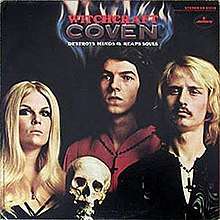Witchcraft Destroys Minds & Reaps Souls
Witchcraft Destroys Minds & Reaps Souls is the debut studio album by the American rock band Coven. Released in 1969, it was unusual in that it dealt with overtly occult and satanic themes and was removed from the market soon after its release due to controversy, particularly as it coincided with the hysteria surrounding the Manson family and rampant media speculation about occult influences on the American counterculture. Despite its brief initial release, it remains a classic of its genre, and in some ways set groundbreaking trends for later rock bands. This album marked the first appearance in music of the sign of the horns, inverted crosses, and the phrase "Hail Satan". Today, these are characteristics of the occult and heavy metal genres.[3] According to rock journalist Lester Bangs, "in England lie unskilled laborers like Black Sabbath, which was hyped as a rockin' ritual celebration of the Satanic mass, something like England's answer to Coven".[4] As a further coincidence, Coven's bass guitarist and co-writer (Michael Gregory Osborne) is credited as "Oz Osborne", and the opening track is "Black Sabbath".
| Witchcraft Destroys Minds & Reaps Souls | ||||
|---|---|---|---|---|
 | ||||
| Studio album by | ||||
| Released | October 1969 | |||
| Recorded | 1969 | |||
| Genre | ||||
| Length | 45:55 | |||
| Label | Mercury | |||
| Producer | Bill Traut | |||
| Coven chronology | ||||
| ||||
| Review scores | |
|---|---|
| Source | Rating |
| Allmusic | |
One of the songwriters, James Vincent, appears with the name "Jim Donlinger" on the album. He actually was not a member of the band (prior to this he was in the band Aorta), but was asked by Bill Traut, Coven's producer (and founder of Dunwich Records, whose logo also appears on the album), to write, arrange and co-produce the album together with Traut. Vincent describes the event in negative terms, as a "bizarre album project":
- "Bill brought me a large box full of books about witchcraft and related subjects. He told me to read them and start writing some songs ... Sometime before the sun came up, I had completely written all the material requested of me for the entire album ... Coven also contributed four songs to the project."[5]
Kurt Cobain and Nirvana spoke of this album in an interview in 1990, stating it is one of the records they'd listen to while driving to the next show on tour.[6]
Track listing
| No. | Title | Writer(s) | Length |
|---|---|---|---|
| 1. | "Black Sabbath" | Donlinger | 3:32 |
| 2. | "White Witch of Rose Hall" | Donlinger | 3:08 |
| 3. | "Coven in Charing Cross" | Donlinger | 4:04 |
| 4. | "For Unlawful Carnal Knowledge" | Dawson, Ross, Wilkerson, Osborne | 4:41 |
| 5. | "Pact with Lucifer" | Donlinger, Wilkerson | 3:32 |
| 6. | "Choke, Thirst, Die" | Donlinger | 3:32 |
| 7. | "Wicked Woman" | Dawson, Ross, Wilkerson, Osborne | 3:01 |
| 8. | "Dignitaries of Hell" | Donlinger | 4:09 |
| 9. | "Portrait" | Dawson, Ross, Osborne | 2:37 |
| 10. | "Satanic Mass" | Traut | 13:19 |
| Total length: | 45:55 | ||
Personnel
- Jinx Dawson: lead vocals
- Jim Donlinger: guitar, vocals
- Jim Nyeholt, John Hobbs, Rick Durrett: organ, piano, keyboard
- Alan Estes, Oz Osborne: bass guitar
- Steve Ross: drums, percussion
Production
- Produced by Bill Traut
- Engineered by Mal Davis
References
- Rivadavia, Eduardo. "Coven | Biography & History". AllMusic. Retrieved October 22, 2018.
- Allmusic review
- "How Coven Pioneered Occult Rock with Witchcraft Destroy Minds & Reaps Souls". NPR. October 25, 2017. Retrieved February 5, 2019.
- Lester Bangs, in a 17 September 1970 review in Rolling Stone Magazine
- Vincent, James, Space Traveler, A Musician's Odyssey, 2003, p 43.
- https://www.livenirvana.com/interviews/9002et/index.php